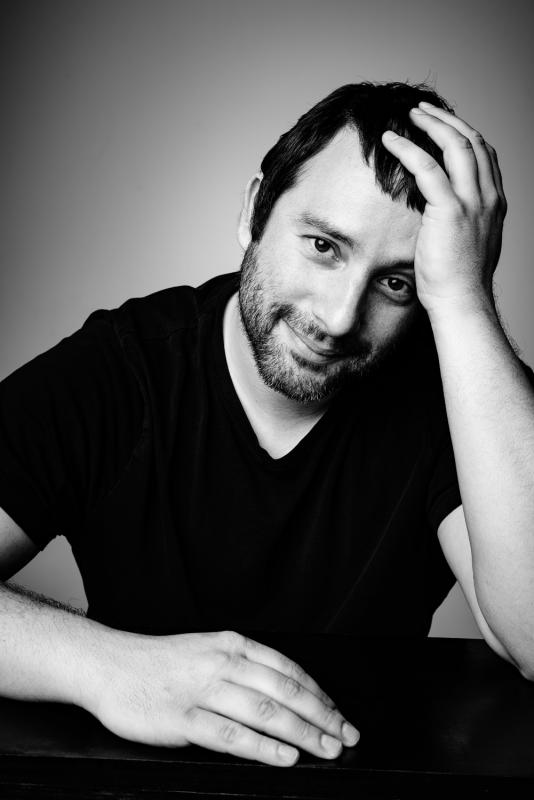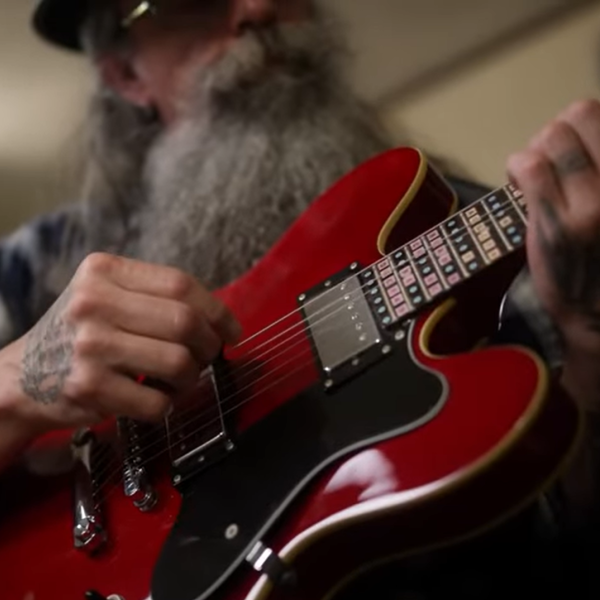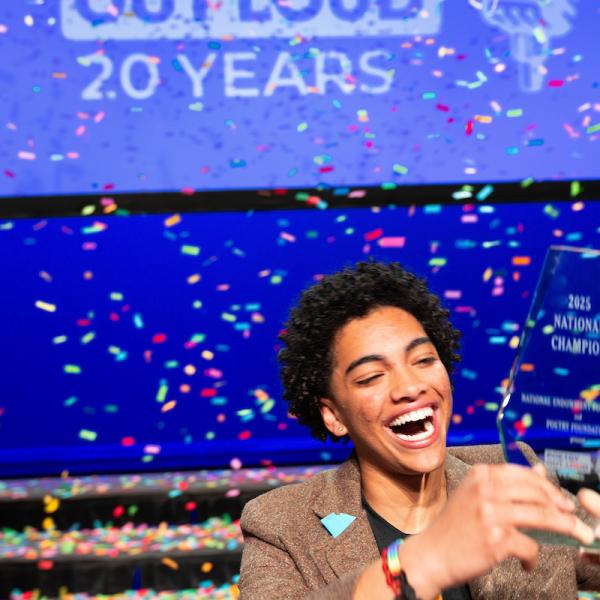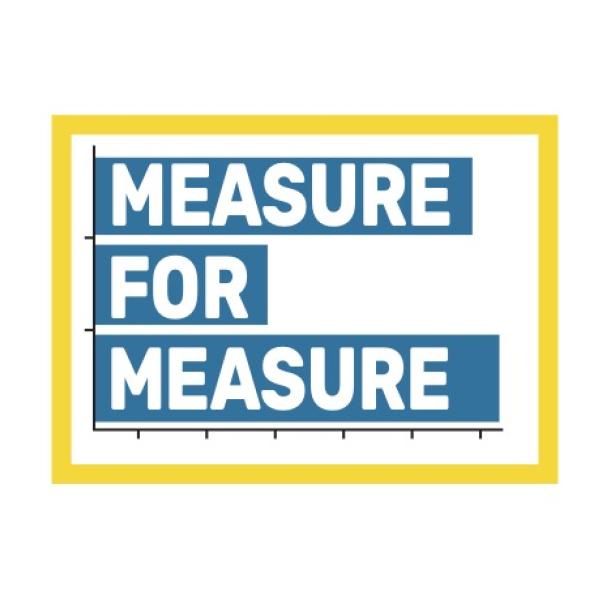Art Talk with Playwright Itamar Moses

The main driver of any musical is, naturally, the music. But in order for songs to soar, the spoken dialogue needs to be just as sharp, just as moving, and just as propulsive as any composition. It’s no small task, but one that playwright Itamar Moses can now say he’s mastered.
In June, Moses won the Tony Award for Best Book of a Musical for The Band’s Visit, whose premiere by the Atlantic Theater Company was supported by the National Endowment for the Arts. Based on an Israeli film of the same name, the show unfolds over the course of a single night, when an Egyptian band accidentally ends up in a desolate Israeli town. Amid the bleakness of the Negev Desert, music transcends the gulf between strangers, and reinforces our shared desire for human connection. The Band’s Visit collected nine other Tony Awards as well, making it one of the most Tony-winning musicals of all time.
Throughout his career, Moses has also written the book for the musicals Fortress of Solitude and Nobody Loves You, whose world premiere by Second Stage Theatre was also supported by the NEA; worked as a screenwriter for television shows such as Boardwalk Empire and Men of a Certain Age; and authored eight full-length plays, including Bach at Leipzig, Back Back Back, and Outrage, which was developed during an NEA-supported residency at Portland Center Stage. We recently spoke with Moses about his early experiences with the arts, how The Band’s Visit was transformed for the stage, and what fuels his creativity.
NEA: Congratulations on the Tony! Was it the best day of your life?
ITAMAR MOSES: I guess it was one of them. I was able to sustain a continuous good mood for more days in a row than is usually possible in adult life.
NEA: Let’s talk about pre-adult life for a minute. Did you grow up in an artistic household?
MOSES: My parents are not artists, but I grew up in Berkeley, California, where the arts are valued and taken seriously. There are a lot of writers who live in Berkeley. So I did grow up in a town and in a household where books were valued, and where writing was a thing that was taken seriously. My mom is a psychotherapist which, I think, has some influence on me becoming a playwright—that mode of delving into human psychology and the motivations that people themselves are not aware of. My dad was an academic. He’s retired now, but for decades he taught film studies and also filmmaking, so was artist-adjacent, and now that he’s retired is thinking about trying to make his own films. They both care about theater, and took me to plays and stuff. So certainly the house I grew up in instilled me with a respect for the arts.
NEA: When or how did you decide to go into playwriting?
MOSES: My first ambition in writing when I was ten or eleven was to write fantasy and science-fiction novels because that's what I was reading. And then I thought I wanted to write fiction or be a novelist. Towards the end of high school, I got more interested in playwriting for a couple of reasons. I had some friends who were doing theater and writing and putting on their own plays. That sort of planted a seed in my head. Also, it was when I was a senior in high school that Angels in America had triumphed on Broadway and was now touring the country and being produced regionally. I read it, and then I saw it when it came to San Francisco. That sort of pushed me over the edge. In college, [theater] became my main extracurricular activity, and what I spent most of my time outside of class doing—acting in plays and putting on my own plays. By the end of college, that had become the thing I wanted to do.
NEA: Your parents are originally from Israel. Did that inform your experience writing The Band’s Visit?
MOSES: It did. First of all, I felt like I had some authority to be the person doing this. It’s always the case that you should kind of know what you’re talking about if you're going to write about a particular general experience. But we’re at a moment now in the theater, and in the arts in general, where it's especially true because there’s a lens focused on who has the right to tell what story. It's a complicated question, but I think it's something everyone has to keep in mind a little bit more now, which is good.
So it answered that question. I've been [to Israel] many times. I have tons of relatives who live there. The music of how Israelis talk, but also people in the Middle East, in general, how their English sounds—the music of that was very clear in my head. I felt like I had an understanding of the region that made me the right person to do this.
It also helped because, while a lot of the dialogue in my script is from the film, a lot of it isn't, because I ended up extending scenes, or writing scenes and moving things around. So I needed to have those voices in my head in order to do that, and also the psychology of those behaviors.
NEA: This isn’t your first adaptation. How did you balance trying to honor the original film while also making it work for the stage while also making it a musical while also making it your own?
MOSES: Compared to doing an adaptation like Fortress of Solitude [the Jonathan Lethem novel that Moses adapted into a musical], or novels into screenplays, this was much closer. The novel is a deceptively faraway form from a scripted form, because novels are full of subjective experience and long passages of description. They aren’t structured as a string of dominoes of events that hit each other to create forward momentum.
Whereas, something like The Band’s Visit, where you’re going from screenplay to play, well, those forms are already close cousins, if not siblings. You have a dramatic structure already in place. I liked the movie, and I wanted to preserve what was good about the movie. My attitude was if it's not broken, don't fix it. I first wrote a draft as a play with no songs. If we were trying to do this as a play, what would you have to change? What scenes would you have to compress or remove or elide in order to do simple things, like keep this to fewer locations?
Then, of course, we had to add songs. That was sitting down with [composer and lyricist] David Yazbek with the script and going through page by page and circling moments we felt could be musicalized. Like, “Let’s cannibalize this portion of this scene and it will be a song or monologue.” If there was an emotional moment, [David Yazbek would say], “Could you write a monologue that I can then cannibalize to be this character's internal life that will become a song?” That was how we built the score up on the chassis of the script.
The third thing that happened was we started doing readings, and we began to see where the event structure—which feels complete in the film—felt a little thin onstage because you've lost all of the visual storytelling tools: the effect of a close-up on a person's face, or images of the bleak desert landscape. Each storyline seemed to need one-and-a-half more beats in order to feel complete onstage. If you only added one more event, it wasn't enough. But if you added two or three more events to one of the storylines, it felt like too much and tipped over. So there's a beat-and-a-half of extra extensions out of what the movie establishes in every storyline. Most of the changes are in that spirit, where the movie would set something up and then I would complete the gesture in a way that would fill it out for the stage.
NEA: You started talking about how you worked with David to identify moments that were ripe to become songs. What spoke to you when you were looking through the script?
MOSES: It's partly just instinct. I was lucky. It’s Yazbek’s fourth musical, so his instincts for that are pretty refined by now. Often it was him saying, “What about this? I think that could be a song.” Sometimes we wouldn't know if we were right until he tried to write the song. His ability or inability to write the song would be the sign that it was a good or a bad idea. If the song came out easily, it would be like, “Oh, you're right.” But if he was banging his head against it, he’d call me back a couple of weeks later and say, “I can't do it, which makes me suspect there isn't a song there.”
Sometimes the most interesting songs ended up coming later, because the more we knew about how what we were making functioned, the more we knew about what needs the score needed to fulfill. We’d do a workshop or reading and watch it with an audience. You could feel moments where they expected a song. We didn't even know we had set up a song and didn't deliver it. Or the opposite, where you stop for a song and you can feel the audience not wanting to stop there, so maybe that song doesn't belong.
NEA: Do writing plays and writing musicals fulfill different parts of your creative process? Do you prefer one over the other?
MOSES: I think that if I had to pick only one, I would pick playwriting because you’re completely in control. It's completely your vision. You don't have to negotiate over final creative decisions. But I do really like book writing as a complement to the other things that I do. First of all, when a musical works, you can affect people's emotions in a way that's very, very difficult with a play. Music can pierce through people’s psychological defenses, and if you pair that with a story that earns those emotional manipulations, it's really powerful.
The other thing is that I think it's healthy, in the same way I think it's healthy to be a TV staff writer every now and then. There’s something egoless and about being a team player, having your role support a vision that's larger than any one of you. Now, this is true when you're a playwright, also. But it's easier to forget because you're in a more central position. The writing department is you. Whereas, the creative department on a musical is you and the composer and the lyricist and the music director and the director and the choreographer. There’s this sort of creative group mind on a musical. It's healthy, I think, to know how to be a part of that. So I do really like it as a balance in my life.
NEA: Do you have any routines or rituals that you use when writing, like a particular time of day or place or listening to music?
MOSES: My answer was the same for a very long time, which is that my routine was getting up and taking my laptop to a café and trying to get two or three hours of writing done before I did anything else that day. The question was never “Am I going to write today?” It was more like “Am I going to get back to writing?” Even if I didn't, I had already done two or three hours in the morning.
I did that for many, many years. Lately I have gone through a shift where I began to feel that that routine had begun to stifle my creativity. It had become regimented to the point where I was forcing myself to do this morning work whether I had anything that I was excited about to work on or not. It was removing the joy and that, in turn, was making me write badly or not at all. I'm capable of making myself write things that I'm not 100 percent passionate about, which is dangerous—I get cranky and depressed and angry when I’m doing that. I have some sort of negative reaction to doing it. So what I'm trying to do these days is listen to that reaction, even if it means I produce fewer pages on a month-to-month basis.
NEA: Something we talk about a lot at the NEA is this concept of failure and its role in the arts. Can you talk about how failure may or may not have figured in your career, and whether it’s been beneficial?
MOSES: I had a very sort of whiplash-y experience starting out, where I started to get my first professional productions right away, before I was even done with grad school. So that was great. I had this early success in the sense of a career is beginning. But then many of the early reviews for my work were critical in a way that felt slightly unfair to me. There was something about my voice early on that seemed to make some critics want to minimize what was good about my work. There was this sort of undercurrent of “Who does this kid think he is?” The fact that I was being produced young became this cudgel to hit me with.
So I could never claim to have failed in the sense that once I broke through, I continued to make my living as a writer and that never stopped. That was very, very lucky and I have to perceive that as a success. But there was this other parallel experience I was having which was like, “Oh, my work isn't getting a fair hearing in a lot of major quarters.” I carried this frustration for a few years about what I felt was a skewed lens through which a lot of my work was being viewed.
Now, all of that may not have been real. It may have been largely in my own head, and just the result of a narcissistic trauma that I experienced from getting some early bad reviews. But that is still real in your life—the labyrinth you make inside your own head. It's more real in some ways—you're dealing with it on a moment-by-moment basis. I think having to mature to the point where I could overcome that set of internal obstacles, and write exactly what I want to write anyway, feels like a really important step in my development. Even if the obstacle was imaginary and I made it up, I think I might have made it up for a reason, like my unconscious wanted me to have to overcome that or have to grow past that. I will say that having a success like The Band’s Visit always helps. It always helps to get external validation that counters those destructive narratives that you're carrying around inside your head.




